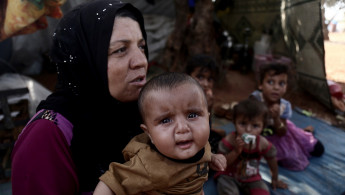Syrian first responders warn of 'winter catastrophe' in Idlib
At least 450,000 people were displaced during the regime’s latest assault on Idlib province, which began in April 2019 and has killed 1,371 people. Many have moved from southern Idlib to relatively safer areas in the north of the province.
The Idlib area was already host to hundreds of thousands of refugees fleeing regime attacks on other other parts of Syria before the Idlib assault began.
The Response Coordinators Group called on all humanitarian organisations “to contribute effectively to the winter needs of the camps in general and to provide services to the most vulnerable”.
The statement also called for the immediate establishment of shelters for refugees living in schools, in order to allow students to return to school.
Only half of Idlib province’s 1,193 schools are expected to be able to operate this school year.
Winter is an especially difficult time for refugees in Syria and neighbouring countries. Refugee camps are often flooded by rainstorms and children have previously frozen to death when the temperature has fallen below zero.
The situation is likely to be especially difficult this year because most of the 450,000 refugees displaced by the regime’s most recent assault have found no shelter in pre-existing camps, forcing them to camp in fields and olive groves where there is no protection from the elements.
Conditions for these people are already dire, with outbreaks of tropical disease occurring because of the lack of sanitation and health facilities.
Follow us on Twitter: @The_NewArab





 Follow the Middle East's top stories in English at The New Arab on Google News
Follow the Middle East's top stories in English at The New Arab on Google News

![MP Essam Diab's pursuit to block TikTok in Egypt has revived an already ongoing debate in the country. [Getty]](/sites/default/files/styles/image_330x185/public/1230748046.jpeg?h=a5f2f23a&itok=-8MqBLLC)
